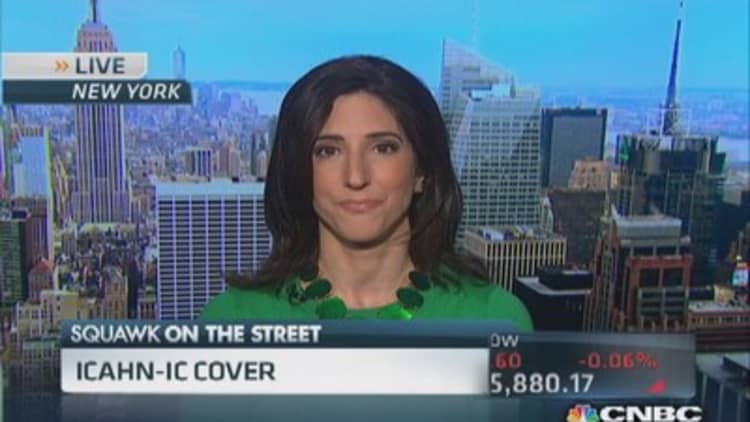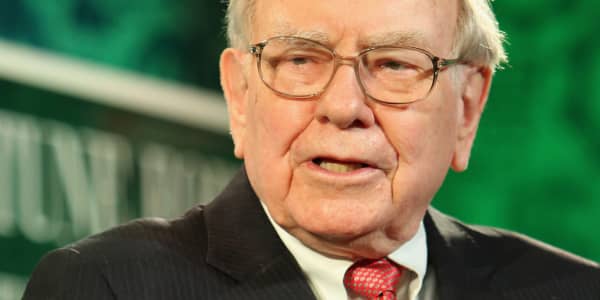Last week Ralph Nader and Carl Icahn were essentially arguing the same point about how companies should treat their shareholders: by turning more in the way of profits back to them.
The strange coincidence wasn't lost on Nader, who seized the moment to call on the feared corporate raider, as well as corporate reformers and individual shareholders, to donate to shareholders rights groups.
"[The hedge fund activists] are very unilateral. They have their own quest and motivation. I think [this effort] will bring people like Carl Icahn to a broader plane of change and reform," Nader said in a recent interview.
Nader has a knack for recognizing, creating or climbing aboard sea changes in the American political consciousness. If 1960s was the right era for auto safety, and the '70s and '80s were the decades for environmental reform, are the 2010s the era of shareholder rights?
The famous consumer advocate is asking corporate reformers and shareholder activists—including Icahn, who has been pressing cash-rich Apple to buy back its stock—to pledge 1 percent of their net worth annually for three years to help start a corporate watchdog movement.
"I don't know of any other area ... where the reformers are better endowed: Some of them are former heads of SEC; some are very successful in business," Nader said. "But we'll have a ceiling of $1 million ... in order to console people like Carl Icahn. We don't want to upset him."
And to get the ball rolling, Nader said he is going to pledge for three years. "That's $50,000 a year, for anybody that's curious."
Nader is involved with two shareholder groups: ShareholderRespect and Penny-Brigade. ShareholderRespect was created in an effort to empower Fannie Mae and Freddie Mac shareholders. Last month Nader held a conference call demanding congressional hearings on Fannie and Freddie, a battle he has been fighting since 2011. Penny-Brigade is a broader call to arms for shareholders that grew out of Nader's work on behalf of Cisco shareholders. He is soliciting shareholders to contribute a penny for every share in a company they own.
(Read more: Here is how to tell whether your retirement plan stinks)
Nader made his most recent call to shareholder arms at a Fiduciary Institute conference last week honoring Robert A.G. Monks, the founder of Institutional Shareholder Services Inc. Both Monks and Nader have called for brokerage firms to adopt a fiduciary standard that would require them to put the best interests of clients before their own. "The subject is concentrated corporate power that is immunized from the law," he said in a Q&A with CNBC from the sidelines of the conference. "Corporations were established to give limited liability to owners. They have evolved to give limited liability to the corporation itself."
Nader spoke with CNBC about the financial services reform, corporate governance and his own investing filters. The following is an edited version of that interview.
CNBC: What can typical investors do to have a say in corporate governance?
Nader: They can do what they can do as an individual. They can write to the CEO and boards of directors. But it's been my experience ... that unless we get institutions with full-time people doing something about it, change very rarely happens. It does start with talk, with books, with litigation. It does start with hearings. It never goes very far unless there's somebody there.
CNBC: Why do you think this will work?
I noticed that it had $45 billion in liquid assets. They made sure that 80 percent was overseas [cash brought into the United States is taxed at a higher rate.] They had the excuse [of the tax rate] when I called up and said, 'Why don't you use the money to declare a dividend?'
I proposed a penny brigade. If you get ... enlightened people to dedicate a penny per year per share, they will raise enough money to be corporate watchdogs. I got a flurry of people saying, "I'll pledge."
Then I made another call to Cisco. ... I happen to know the general counsel. He interned for us once. I explained about the penny brigade. Lo and behold, they now pay a 3.1 percent dividend.
(Read more: 6 tips from Jack Bogle on teaching kids to invest)
CNBC: Why now for corporate governance?
Nader: Check out Time for a Raise if you want to find out how shareholder rights hits real people.
We're not dealing with abstractions. There is real concentrated power in corporations. Look what you have: companies with serfs, muscling communities. They get rid of the small business. They can push people around. Changing that is possible. It is much easier than we think.
I also have a vested interest in shareholders rights. I own Fannie Mae and Freddie Mac. I owned it because the chairman of the Fed said they're adequately capitalized. A few days later they went over the cliff and were subsequently delisted from the NYSE. They were using the shareholders and abusing them and holding them in limbo. ... They let Citigroup shoulders have a chance to recoup their losses, but not Fannie Mae and Freddie Mac shareholders.

CNBC: What does your portfolio look like?
Nader: I invest in things that support our work. High-dividend stocks. Independent partnerships. Wind companies. I have my own screening. There are certain things I won't touch—nuclear things, military. I'm not going to buy AIG shares and Wall Street shenanigans. I'm not going to buy Monsanto or nanotechnology stocks.
CNBC: Why not nanotechnology?
Nader: It has no legal framework. All you hear are its plusses. But at some point you're going to have a microchip in your hair recording everything.
CNBC: Come on.
Nader: Really. The two most tumultuous technologies: genetic engineering and nanotechnology. Neither have any legal and ethical framework.
(Watch: Morgan Stanley's vice chairman on shareholder activism)
CNBC: What's the scorecard on the new Consumer Financial Protection Bureau?
Nader: It's a good start. The history of regulatory agencies is full of good starts. The worry is that they'll increasingly be captured. They're already under the Federal Reserve.
CNBC: It's five years to the day after Bernie Madoff was discovered. Are Americans any safer from this kind of fraud now?
Nader: It's hard for me to believe the SEC could incur a second Bernie Madoff. But in a way, he stood behind his own fraud. ... We're now dealing with anonymous corporate entitles that are headed by people whose name nobody knows, who can shift their strategies. It could easily happen again and again institutionally.
CNBC: People have been shining a spotlight on corporate reforms for years. Nothing changes.
Nader: The reformers become very discouraged themselves. There's a satiety that sets in. They start exaggerating what it takes to turn it around. But the moment you say you're powerless, you are. If we don't move from analysis to existential action on the ground, we'll be analyzing forever as the world crumbles.
CNBC: Do you think Carl Icahn will donate?
Nader: He's Princeton ('57). We do things.
CORRECTION: This version corrected a typographical error in Nader's response about the value of Cisco Systems' cash balance. It was $45 billion.
—By Elizabeth MacBride, Special to CNBC.com





